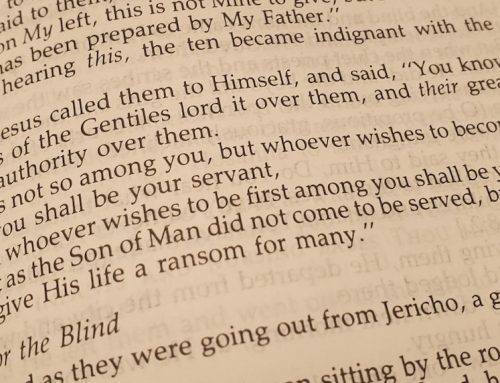Let’s visit the question of why non-member classes are used almost exclusively for inducting and indoctrinating new members rather than actual public meetings of the church. This is a powerfully effective approach for attracting the right personality type, but interestingly enough, it’s not at all how it was done in the first century. Why is that? Answer: message control.
Since most visitors never come back after the first class, recruiting is purely a numbers game. The more “contacts” you funnel into the class through knocking on doors, the more prospects you have. The first class weeds out the ones who know enough about the Bible to smell a skunk. Those will never come back. The second class weeds out those who don’t know anything about the Bible, but can think for themselves, and still smell a skunk. Those who come back to a third or fourth class are much more likely to buy into the real doctrines that will only get exposed later in the indoctrination process. Evidence: How often have new members been told not to question this, that, or the other teaching because “you’re not ready for that yet?”
This process is a self-selecting one that produces a flock primarily of followers. Once someone comes in by this route, most personality-types with leadership potential are weeded out, and those who remain are ones who will drink the cool-aide and follow orders from higher-ups, at least for awhile. When too many red flags go up and they’ve had enough, they are either withdrawn from, leave, or both.
They justify their recruiting methods in a couple of ways. First, they say that the public assembly is for the church, not unbelievers. Really? Then why did Paul write this?
1 Corinthians 14: 22-25 Tongues, then, are a sign, not for believers but for unbelievers; prophecy, however, is not for unbelievers but for believers. 23 So if the whole church comes together and everyone speaks in tongues, and inquirers or unbelievers come in, will they not say that you are out of your mind? 24 But if an unbeliever or an inquirer comes in while everyone is prophesying, they are convicted of sin and are brought under judgment by all, 25 as the secrets of their hearts are laid bare. So they will fall down and worship God, exclaiming, “God is really among you!”
Note that the whole church was coming together, and there were expected to be both believers and unbelievers present. Also note that the teaching that took place in the church meeting was powerful enough that unbelievers fell down on their faces and said “God is really among you!” The early church had nothing to hide from non-members in their public assemblies, and they were clearly informative and uplifting, not solemn funeral-like rebuking sessions.
Second, they will say that the early church knocked on doors from “house to house.” This is misleading, because while Paul did go from house to house teaching people about Jesus, the early church did not do “personal work” for recruiting people to non-member classes. That is purely a 20th century construct. Paul’s method of operation was to publicly teach about Jesus, and he’d get invited into homes to explain more of his message.
Is it wrong to knock on doors doing “cold calls?” Of course not. But let’s be honest about the recruiting strategy of cold call invitations to a non-member’s class rather than the public assembly. It’s designed so they don’t scare away the non-members by the bizarre and sometimes unloving practices of members, like public confession for not wearing nylons, hour-long public rebuking, and a worship service that feels more like a funeral rather than joyful Christians wanting to fellowship and encourage each other.
That’s why the churches don’t advertise or in anyway publicize their main worship time. Visitors are not wanted in the public assembly. It clearly makes it easier to indoctrinate non-members if they are fed the party line one bite at a time in a controlled environment rather than all at once in the public assembly.






And this is one of the topics that the red flag should fly high reading cult! It was so hard for me to accept the FACT that I was raised in a cult. Also very eye opening to come to those terms. Lord help those who are in the cult to open their hearts to Your Word and Your ways not Gary, Tom or Kim's ways. I know it is so hard for them to be able to read God's Word for what it say's and not for what they have been taught it says. Remember coc members God is… Read more »
That's exactly right. There is so much fear of man and following of men. I don't know how they don't see it, but I keep hoping that with enough love, our words will someday be taken to heart.
Totally true Kevin and insightful.
The definition for the word cult is 'a system of religious worship or ritual'. Webster's New World'. So looks like we are all in trouble.
Father in Heaven, forgive them, they don't (all) know what they have been doing. And for the ones who do know what they are doing, bring them to the place of repentance and forgive them too. Father, give us the grace to forgive them, 70 x 7, and on and on because at times we feel like the ones losing. They fail to see the logs in their eyes and proceed to bulldoze all in their path. This is your war and you've already won. Jesus help us to build some bridges here and to turn the other cheek. Give… Read more »
Amen Andrea. I love your spirit, and I too love the people who have been so captivated by their misdirected zeal without knowledge. There's nothing I would love more than to have the teachers and leaders of this church soften, admit error where necessary, and move forward to educate their flock about the love and grace of God. For all the damage that's been done to the faith of so many, imagine if the leaders turned to God with humble heart and brought the flock along with them on their journey to a better understanding of who God is and… Read more »
Andrea, that was beautifully written. I don't know you but I knew your parents. Thank you for that heartwarming, peaceful, kind message. I know you've endured a lot, but there isn't a hint of bitterness. You made my day. I endeavor to free myself of all bitterness and pain. It's been a long journey for me and my family. Peace.
It's not me but CHRIST in me who speaks. I'm glad He made your day. I married into the sweet and loving, well intentioned Ezell family. You know my in-laws. I have been hurt probably in similar ways as many here. Jesus calls us up and out of pain and despair. I quoted parts of a song that I love above– should have said that, oops. tenth avenue north is the group and the song is "losing". That song was aired on the Christian radio station during the biggest trial of my adult life. God used that to help to… Read more »
That is a beautiful sentiment Andrea Ezell! Warms my heart just reading it!
Do you think anyone from the Stanton Churches of Christ are listening to any of this? Perhaps you are simply preaching to the choir. And what do you want them to do? Blend in with the main-line churches of Christ, totally disband, stay together but implement your changes? I'm trying to realize the end result to this communication and am not sure where to set my moral compass on this subject. If it's blend with the main line churches of Christ then we have another problem.
They're listening. They're reading. Typically, leadership will be privileged to read dissenting opinions, similar to discussion at May meetings. Implementing damage control, congregants will be forbidden to read opposing viewpoints. What we're trying to do is get at the truth. Either it is the truth or it isn't. Either it's an opinion or it's the word of God. For you, Anonymous at 2:09, is it the truth or is it opinion and rules of men? I say many opinions are taught and required as extra-biblical rules. What do you think?
I think maybe you're too focused on the short term results and perhaps institutional reform rather than my goal, which is long term reform of individuals to come into line with a more accurate understanding of God and Jesus Christ. Christianity doesn't start with the church, it starts with Christ. The church comes about as a result of believers banding together to share their faith and encourage one another in it. The organization of the visible church will take care of itself as believers align themselves with Jesus and the Word of God.
Anonymous 3:29: I have to say I like the way you write. Makes me stop and think. What do I think? You dont have room for me to say what I think. Taking info from the past Churches of Christ that have existed in our land and from the present time there is so much division and different ways of thinking who can say what is the right way of thought or what is the wrong way to think.I have become an observer in all of this. So I guess that is what I think.
This is so very interesting! I grew up in the coc and have always been a very observant individual and after going to countless non member classes I startd to wonder y every class sounded soooooo similar. They beat that stuff into your head over and over and the younger brethren are required to go so they get their memories refreshed every week ultimately strengthening their "faith".
I also was in the Stanton church of Christ and now I am in the mainline Churches of Christ. And in defense of non-member classes I find where I am now there is very little ability for them as a whole to teach souls that are lost the first principals of Christianity. But those of us from the Stanton Churches have no problem with Christianity's first principals. In fact, I would address one subject in particular just to prove my point but I don't believe Kevin wants to turn his blog into a doctrinal debate so I'll leave it for… Read more »
Anon 9:25, you can email me on the side if you want to: kevinmharper@gmail.com.
I am not denying the effectiveness of non-member classes, although I think a more Biblical approach is to have better teaching during the public assemblies. It is the underhanded use of non-member classes to hide the true doctrines of the church that I have a problem with.
I was looking for an appropriate topic to ask this question. This seems good as any (unless it's been addressed elsewhere). One of the things that really bothers me is the questioning of non-members' lives that causes them to be rejected for baptism. This seems to happen often where I went, especially for door non-members. The last one who wanted to get baptized was told to come to the next class after her had more time to think about it. I was wondering if this happened in the New Testament when 3000 were baptized in one day? You think there… Read more »
Yes, absolutely it's said to add carefully is what I've heard throughout the years. Just the past couple months 1 Corinthians 3:1-7 was used to back up his point. If I understood right. I had the same thought as you have what about on the day of Pentecost? Acts 4:4 mentions about 5000 who heard and believed. I seen a good handful who were not candidates for baptism so deemed the preacher, possibly the teacher too.
1 Cor 3 doesn't make sense to me as an explanation for rejecting people for baptism. If anything, it proves that only God knows the heart, as it is He who gives the increase/growth. So I don't understand the invasive questioning. If one falls away, that's on them, since it's God who adds anyway.
I was taught to screen out the unwanted people, mainly those corrupted by uncleanness, as they are no longer of a sound mind. I followed the teacher council for a while, but due to the constant harassment (persecution), insults and oppression; I rebelled and started inviting everyone they didn't want. I invited a 12 year old boy and he showed up and sat through half the non member class when he said he had to go home for school the next day. They asked him how old he was and he said 12 and then they asked him who invited… Read more »
Seeking 10:46 looking at 1 Corinthians 3 again looks like the point that was made goes down to v10.